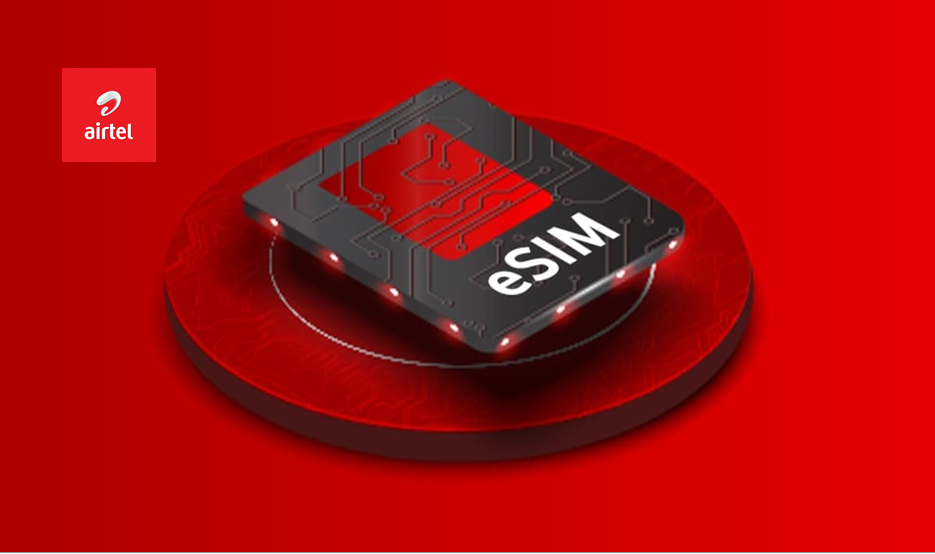Airtel Launches Its eSIM Technology In Nigeria
Airtel dives deeper into developing high-end technology by virtualizing its mobile cellular service with embedded SIM. The eSIM introduction allows users to access the Airtel cellular network virtually without the controversial plastic SIM card. The embedded SIM by Airtel is flawless to errors to activate or complete the transitioning process.
Immediately after Airtel Chief Commercial Officer, Femi Oshinlaja announced its eSIM debut, the telecom company’s eSIM ads were already viral on every social media including Twitter, Meta social networks, and other websites. Oshinlaja’s announcement confirmed the telecom company is keen on digital inclusion in Nigeria and is frontline to the local eSIM development.
“Airtel Nigeria is always at the forefront in championing technological advancement and creating innovative platforms and opportunities that will make life better, more exciting, and more enjoyable for all those in our stakeholder value chain,” Oshinlaja said.
The eSIM has no physical card which elongates its sustainability and environmental availability soothing consumers’ demands. Airtel eSIM is optimal for the telecom company as an accomplished business plan to evolve communications systems via virtual electronics.
Oshinlaja commented about its corporate “commitment to continue to create offerings that will expand and deepen our digital footprints in line with our positioning as the network of first choice in Nigeria for everything mobile Internet, digital, and home broadband.”
Airtel joins the list of telecom companies to sell embedded SIM to customers. The likes of MTN and 9mobile are the pioneers of selling eSIM in Nigeria likewise allowing users to transition from the controversial plastic SIM cards to embedded coverage. Airtel also allows customers to transition to the eSIM with simple criteria that demand a preferred device.
Only Airtel and other eSIM providers can transition customers’ plastic SIM cards to an embedded SIM. It is optimal to follow the instructions by the network service providers that also come with a QR code to complete virtualizing the SIM swap process.
The NCC debated the eSIM initiative during the pandemic era which is currently in existence in Nigeria and Airtel is currently an embedded network carrier. At the time MTN Nigeria and 9mobile were appointed by the NCC to debut and test-run the embedded SIM development in the local telecom market.
What is an Embedded SIM?
An embedded SIM is a digitized chip built as built-in software by the smartphone provider. Software-based SIM cards have evolved from advanced technology to embed the same characteristics of the controversial plastic SIM card into digital chips.
Smartphone with embedded SIM gives reasons for burner mobile phones to be an obsolete technology. The virtual SIM cards are embedded in chips and software, shirking the controversial plastic to package the SIM components and technology.
eSIM adopts multiple characteristics pared to physical SIM cards that made the obsolete list. Smartphones with eSIM are high-end technology that allows the device to exhibit multiple channels of communication to the web community including Artificial Intelligence (AI) and the Internet of Things (IoT).
The high-end technology embedded in an eSIM enhances the surveillance system developed by the smartphone maker for tracking and commute meter systems. Aside from tracking eSIM users, the embedment of chips in devices is carbonless emission which is eco-friendly for the earth.
An eSIM-enabled smartphone allows its users to transition to a preferred mobile network provider at will, unlike the controversial plastic SIM cards. For context, an eSIM-enabled device allows its users to order a new SIM card within the device Settings app. Users can transition to their preferred mobile network provider with the best cellular coverage and communicate with the network carrier within the Settings app.
However, Oshinlaja’s announcement encourages eSIM-enabled smartphone users to transition from the current plastic SIM cards to access its embedded coverage. This development will bolster the Nigerian telecom industry including the carrier and the user to experience productivity.









